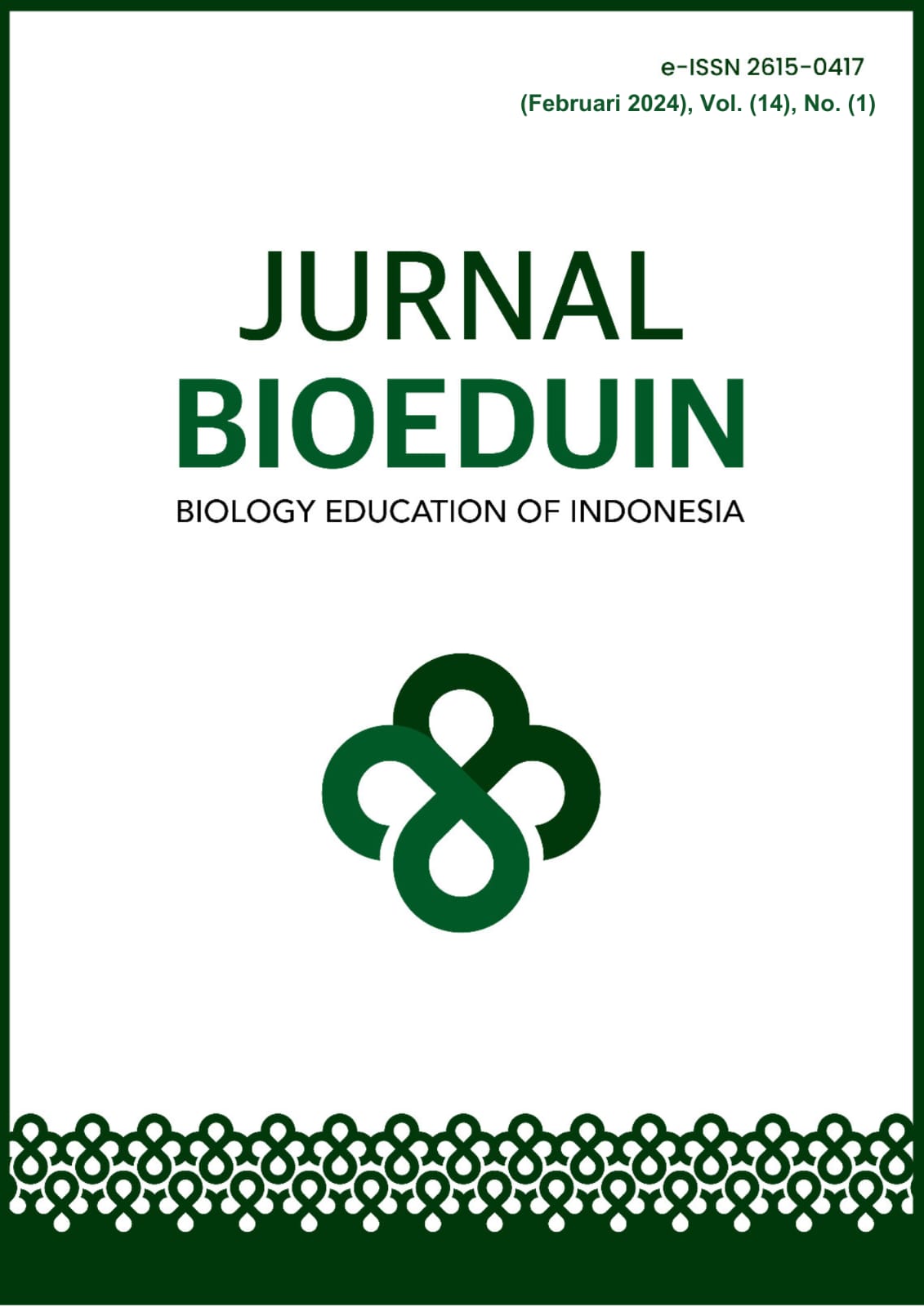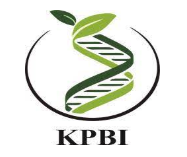Development of Learning Evaluation Instruments to Measure Creative Thinking Skills in The Reproductive System Concept
DOI:
https://doi.org/10.15575/bioeduin.v14i1.33361Keywords:
Creative thinking skill, development of learning evaluation instrument, reproductive systemAbstract
The passage highlights the significance of creative thinking skills as an essential component of 21st-century education, alongside critical thinking, collaboration, and communication skills, collectively known as the 4Cs. The research aims to develop evaluation instruments to enhance students' creative thinking skills in reproductive system material. This topic involves contextual health content, requiring creative thinking to address it. The four indicators for creative thinking skills include fluency, flexibility, originality, and elaboration. The research and development (R&D) method is employed in this developmental study. The passage describes the process of creating 10 questions based on curriculum achievements, followed by validation by experts and a final stage of testing the questions on 40 ninth-grade science students at MAN 2 of Bandung. The results indicate that one question was accepted without revisions, six questions were accepted with revisions, and three questions were rejected. The reliability of the questions reached a score of 0.73, categorized as high, meaning the questions consistently provided similar measurement results. The students' answers to the evaluation questions require creative thinking skills, indicating that these questions effectively train those skills.
References
Chodzirin, M. (2019). Video blog (vlog) sistem reproduksi sebagai media pembelajaran biologi. Jurnal BIOEDUIN, 9(2), 53–63.
Jenny, L. (2021). Pengembangan Instrumen Evaluasi Berbasis Kuis Berintegrasikan Ayat-ayat Al-Qur’an pada Materi Sistem Reproduksi Manusia Kelas XI IPA MAN 3 Jember. UIN KHAS Jember.
Laksmi, M. L., Prayitno, B. A., & Indrowati, M. (2022). Karakteristik Materi Pembelajaran Sistem Reproduksi Manusia. Jurnal Pendidikan Biologi, 13(2), 161. https://doi.org/10.17977/um052v13i2p161-170
Lederman, N. G., Lederman, J. S., & Antink, A. (2013). Nature of Science and Scientific Inquiry as Contexts for the Learning of Science and Achievement of Scientific Literacy. Online Submission, 1(3), 138–147.
Listianti, R., Hidayat, A., & Maspupah, M. (2017). Perbandingan Model Pembelajaran Problem Solving Dan Problem Based Learning Terhadap Hasil Belajar Siswa Pada Materi Sistem Reproduksi Manusia. Jurnal BIOEDUIN: Biology Education of Indonesia, 7(1), 15–26.
Magfurin, M., & Kiswardianta, R. B. (2019). Pengembangan Instrumen Multiple Choice Test (Mct) Berbasis Lks Pada Materi Sistem Reproduksi Manusia. Prosiding Seminar Nasional SIMBIOSIS, 4.
Nila Wati. (2020). Pengembangan Instrumen Soal Three Tier pada Materi Sistem Reproduksi Kelas XI SMA Negeri 9 Luwu Utara. Diss. . Universitas Cokroaminoto Palopo.
Novitasari, A., Sutarno, S., & Masykuri, M. (2020). Development of the Discovery with Team Assisted Individualization (D-TAI) Model to Empower Analytical Thinking Ability in the Material Human Reproductive System. IJIS Edu: Indonesian Journal of Integrated Science Education, 2(2), 119–130.
Rahmawati, A., Ariyanto, J., & Sari, D. P. (2018). Profil Komposisi Jenis Dimensi Pengetahuan dalam Kegiatan Pembelajaran Biologi pada Materi Sistem Reproduksi di Kelas XI MIPA SMA X Surakarta. Proceeding Biology Education Conference: Biology, Science, Enviromental, and Learning, 15(1), 554–558.
Reiss, M., & Winterbottom, M. (2023). Teaching secondary biology. School Science Review in Depth, 104(387), 19–23.
Rozianti, Z. L. (2023). Pengembangan Instrumen Soal Literasi Sains Terintegrasi Konteks Keislaman pada Materi Sistem Reproduksi untuk Peserta Didik MTS. Universitas Islam Negeri Sultan Syarif Kasim Riau.
Sapitri, D., & Ridlo, S. (2021). The Development of Flipped Classroom-Based Human Reproductive System Learning Devices to Improve the Science Literacy Skills of High School Students. Journal of Biology Education, 10(2), 185–193.
Shima, S. D. (2018). Pengembangan instrumen penilaian materi sistem ekskresi dan sistem reproduksi kelas XI SMAN 01 Sumberpucung Kabupaten Malang. Universitas Negeri Malang.
Siswono, T. Y. E. (2005). Upaya meningkatkan kemampuan berpikir kreatif siswa melalui pengajuan masalah. Jurnal Pendidikan Matematika Dan Sains, 10(1), 1–9.
Solihat, R., Eris Rustandi, Wandi Herpiandi, & Zamzam Nursani. (2022). Biologi untuk SMA/MA Kelas XI. Kementerian Pendidikan, Kebudayaan, Riset, dan Teknologi.
Sorgo, A., & Siling, R. (2017). Fragmented knowledge and missing connections between knowledge from different hierarchical organisational levels of reproduction among adolescents and young adults. CEPS Journal, 7(1), 69–91.
Sugestiana, R. (2014). Pengaruh Penerapan Model Pembelajaran Berbasis Proyek Terhadap Peningkatan Kemampuan Berpikir Kreatif Siswa pada Konsep Gangguan Sistem Reproduksi Manusia. Universitas Pendidikan Indonesia.
Taufiq, A. U. (2015). Pengembangan Tes Kognitif Berbasis Revisi Taksonomi Bloom pada Materi Sistemreproduksi untuk Siswa SMA. Jurnal Biotek, 3(2), 1–17.
Torrance, E. P. (2003). Understanding Creativity: Where to Start? Psychological Inquiry. 232-234.
Wahyuni, N., Suwono, H., & Lestari, U. (2019). Learning Difficulties of High School Students in Understanding the Material of Human Reproductive Systems Triggering Misconceptions. Jurnal Pendidikan Sains, 7(4), 116–121.
Widiyati, S., Rochmah, S. N., & Zubedi. (2009). Biologi: SMA dan MA Kelas XI. Kemdikbud.
Zahroh, D. A., & Yuliani, Y. (2021). Pengembangan e-LKPD Berbasis Literasi Sains untuk Melatihkan Keterampilan Berpikir Kritis Peserta Didik pada Materi Pertumbuhan dan Perkembangan. Berkala Ilmiah Pendidikan Biologi (BioEdu), 10(3), 605–616. https://doi.org/10.26740/bioedu.v10n3.p605-616
Downloads
Additional Files
Published
How to Cite
Issue
Section
Citation Check
License
Authors who publish in Jurnal BIOEDUIN agree to the following terms:
- Authors retain copyright and grant the journal right of first publication with the work simultaneously licensed under a Attribution-ShareAlike 4.0 International (CC BY-SA 4.0) License that allows others to share the work with an acknowledgment of the work's authorship and initial publication in this journal.
- Authors are able to enter into separate, additional contractual arrangements for the non-exclusive distribution of the journal's published version of the work (e.g., post it to an institutional repository or publish it in a book), with an acknowledgment of its initial publication in this journal.
- Authors are permitted and encouraged to post their work online (e.g., in institutional repositories or on their website) prior to and during the submission process, as it can lead to productive exchanges, as well as earlier and greater citation of published work (See The Effect of Open Access).









